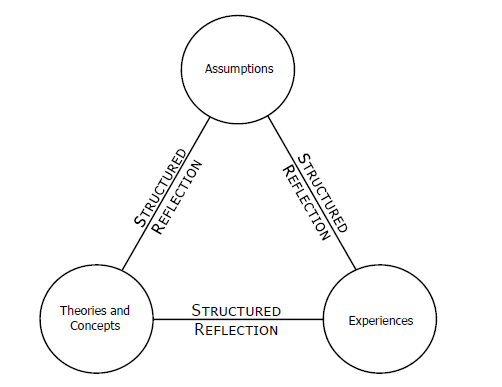(Based on an excerpt from the 2012 Kalamazoo College Self‐Study Report)
Revised: 23 April 2013
Use of structured reflection is becoming part of the fabric of Kalamazoo College and will likely lead to
students developing self‐authorship that will prepare them for transformative learning in college and
beyond. Rooted largely in courses and co‐curricular programming instituted through service‐learning in
the late 1990s, structured reflection developed a strong theoretical and empirical base at the College
through research done in a series of projects funded by grants from The Teagle Foundation in 2004 and 2008.
Kiran Cunningham (Anthropology/Sociology) and Bob Grossman (Psychology) led the way by
investigating factors that catalyze transformative learning, entailing a shift in frame of reference, in our
students. Through their work, and through collaborations with faculty colleagues, they clarified a very
effective approach to, and conceptual framework for, carrying out structured reflection.
Our definition of structured reflection, developed and refined by faculty and staff at Kalamazoo College (1) and illustrated
in the Structured Reflection Triangle below, is the following: Structured Reflection is a process that can
catalyze transformative learning by employing intentionally designed discussions, activities, or
assignments that help students (and others) interrogate assumptions, theories and concepts, and
experiences, make connections and comparisons between them, and thereby develop deeper
understanding of themselves and of complex issues. When engaged in structured reflection, an
individual, or a group of interacting individuals, steps aside from being a subject in a life and begins
viewing ideas held and experiences encountered as objects to be examined and manipulated and as
building blocks of meaning making. Through working along the legs of the Structured Reflection
Triangle, and using the triangle when grappling with unscripted problems, individuals can move from
being externally defined to developing self‐authorship,(2) a pre‐requisite for transformative learning. This
kind of reflection fosters development of self‐authorship both because experiences and assumptions are
part of the substance of what is being examined and because in making connections between them and
with theories and concepts learned the students must do the meaning‐making work.
To be prepared for productive engagement with the high intensity dissonance encountered in many learning experiences in
college, students must understand themselves as meaning‐makers and, more importantly, understand
that the system of meanings they operate out of is itself made. Through self‐authorship students
construct their own educational paths at Kalamazoo College and learning throughout their lives.

1 Cunningham, K. 2010. Putting the anthropological toolkit to use in international and intercultural learning.
Practicing Anthropology 32(3): 23‐26.
2 Baxter Magolda, M.B., and P.M. King. 2008. Toward reflective conversations: An advising approach that
promotes self‐authorship. Peer Review Winter 8‐11.; Kegan, R. 1994. In over our heads: The mental demands of
modern life. Cambridge, MA, Harvard University Press; Mezirow, J. Ed. 2000. Learning as transformation: Critical
perspectives on a theory in progress. San Francisco, CA: Jossey‐Bass.
